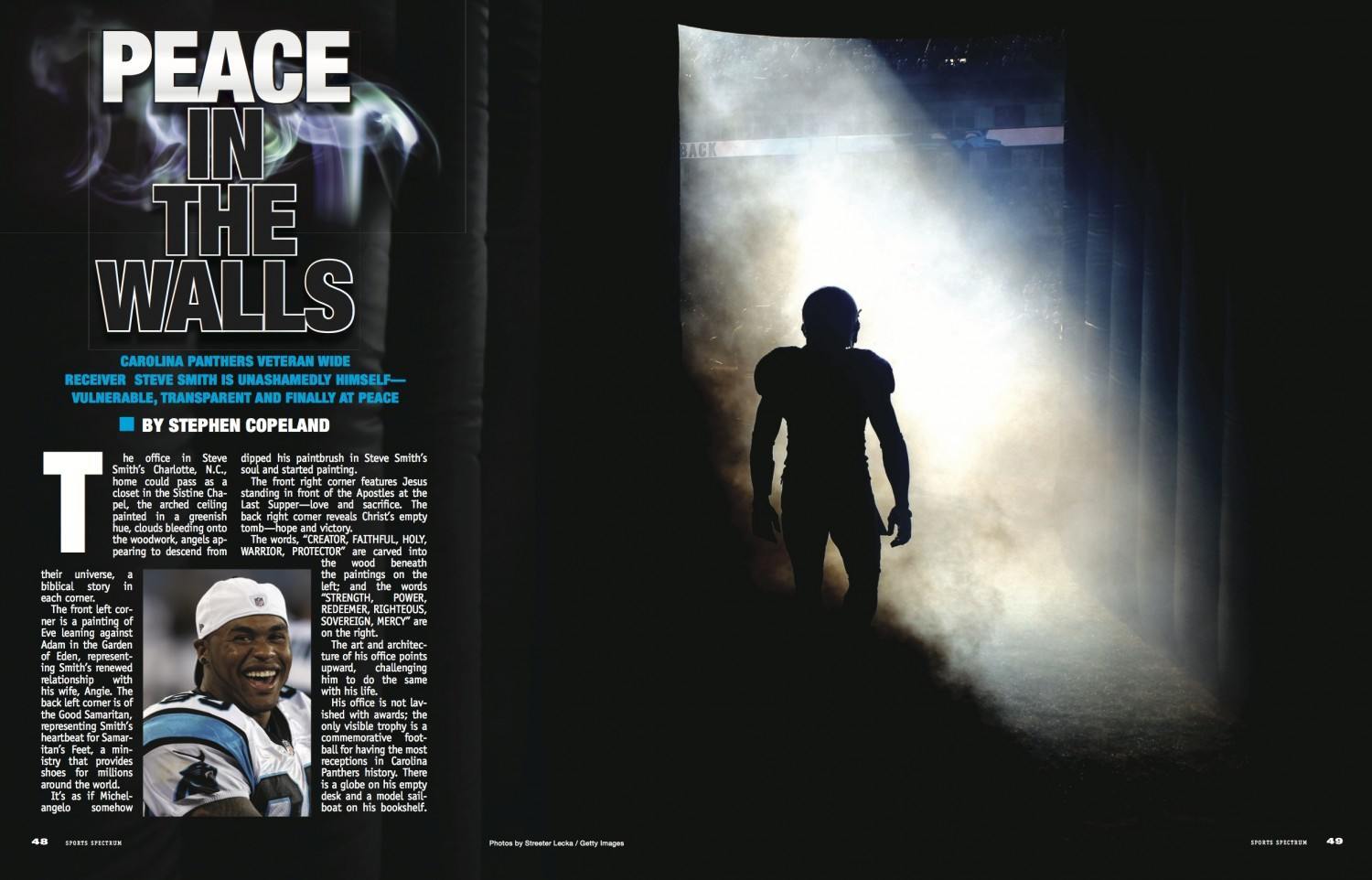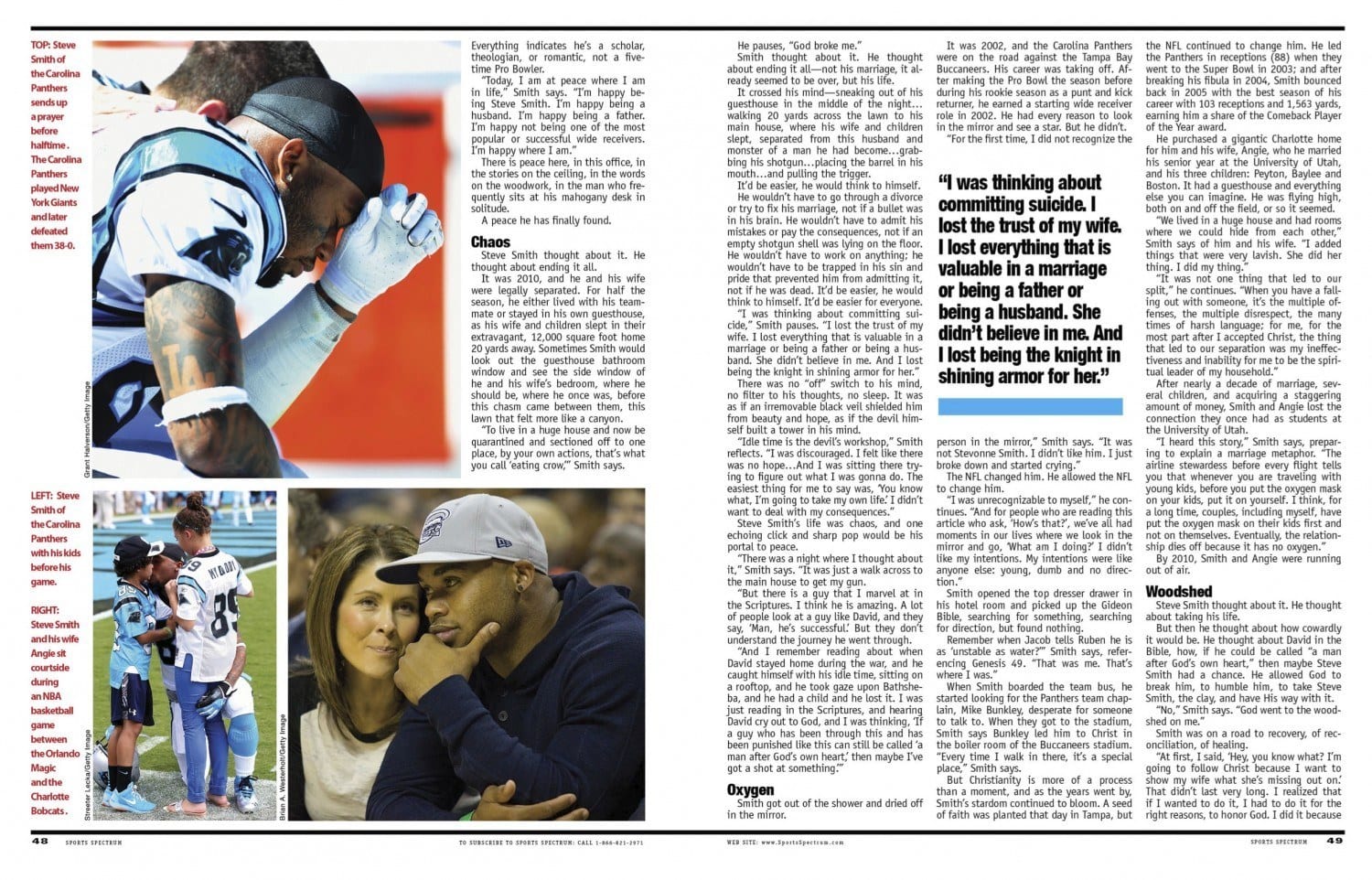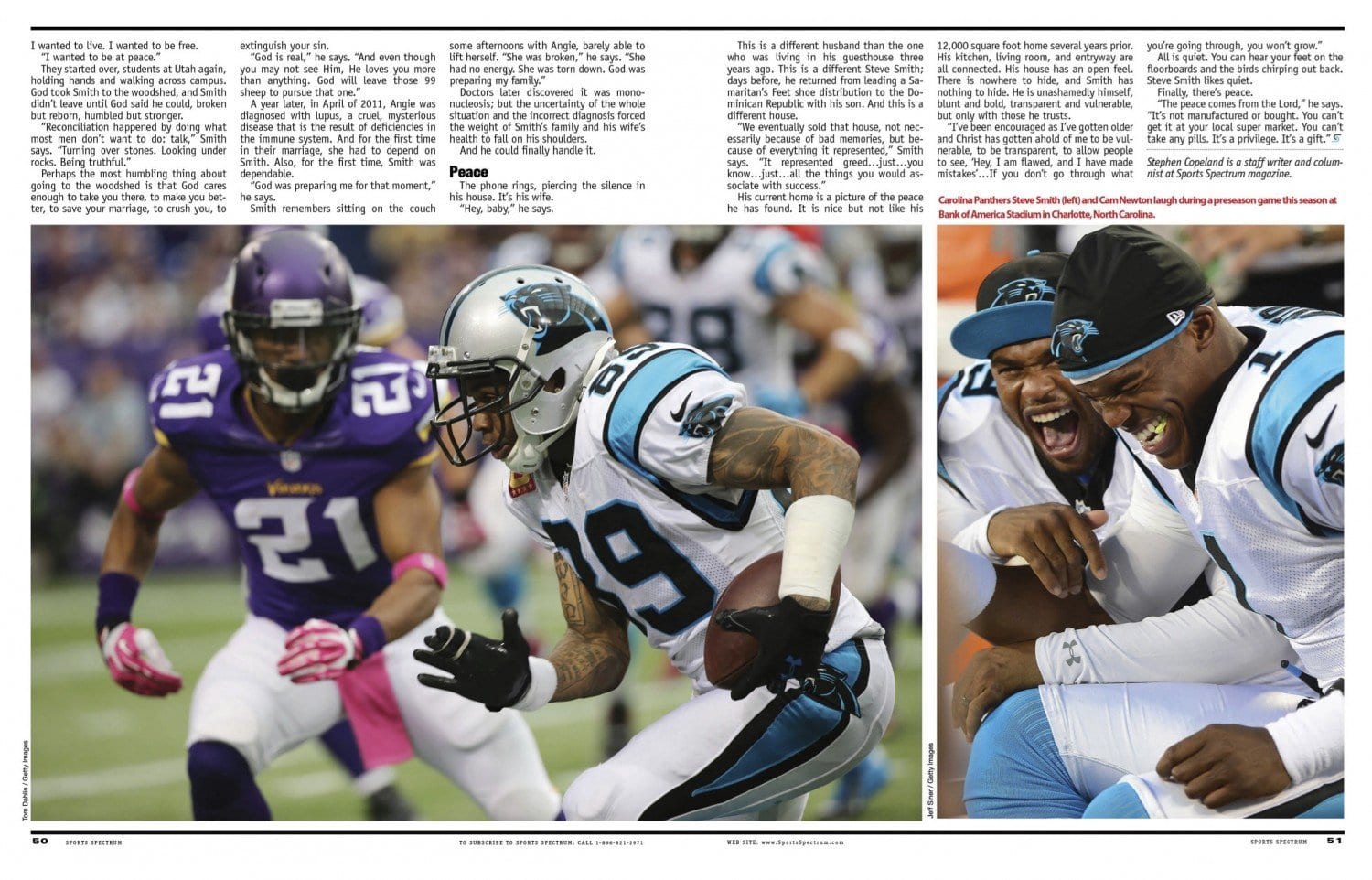The office in Steve Smith’s Charlotte, N.C., home could pass as a closet in the Sistine Chapel, the arched ceiling painted in a greenish hue, clouds bleeding onto the woodwork, angels appearing to descend from their universe, a biblical story in each corner.
The front left corner is a painting of Eve leaning against Adam in the Garden of Eden, representing Smith’s renewed relationship with his wife, Angie. The back left corner is of the Good Samaritan, representing Smith’s heartbeat for Samaritan’s Feet, a ministry that provides shoes for millions around the world.
It’s as if Michelangelo somehow dipped his paintbrush in Steve Smith’s soul and started painting.
The front right corner features Jesus standing in front of the Apostles at the Last Supper—love and sacrifice. The back right corner reveals Christ’s empty tomb—hope and victory.
The words, “CREATOR, FAITHFUL, HOLY, WARRIOR, PROTECTOR” are carved into the wood beneath the paintings on the left; and the words “STRENGTH, POWER, REDEEMER, RIGHTEOUS, SOVEREIGN, MERCY” are on the right.
The art and architecture of his office points upward, challenging him to do the same with his life.
His office is not lavished with awards; the only visible trophy is a commemorative football for having the most receptions in Carolina Panthers history. There is a globe on his empty desk and a model sailboat on his bookshelf. Everything indicates he’s a scholar, theologian, or romantic, not a five-time Pro Bowler.
“Today, I am at peace where I am in life,” Smith says. “I’m happy being Steve Smith. I’m happy being a husband. I’m happy being a father. I’m happy not being one of the most popular or successful wide receivers. I’m happy where I am.”
There is peace here, in this office, in the stories on the ceiling, in the words on the woodwork, in the man who frequently sits at his mahogany desk in solitude.
A peace he has finally found.
Chaos
Steve Smith thought about it. He thought about ending it all.
It was 2010, and he and his wife were legally separated. For half the season, he either lived with his teammate or stayed in his own guesthouse, as his wife and children slept in their extravagant, 12,000 square foot home 20 yards away. Sometimes Smith would look out the guesthouse bathroom window and see the side window of he and his wife’s bedroom, where he should be, where he once was, before this chasm came between them, this lawn that felt more like a canyon.
“To live in a huge house and now be quarantined and sectioned off to one place, by your own actions, that’s what you call ‘eating crow,’” Smith says.
He pauses, “God broke me.”
Smith thought about it. He thought about ending it all—not his marriage, it already seemed to be over, but his life.
It crossed his mind—sneaking out of his guesthouse in the middle of the night…walking 20 yards across the lawn to his main house, where his wife and children slept, separated from this husband and monster of a man he had become…grabbing his shotgun…placing the barrel in his mouth…and pulling the trigger.
It’d be easier, he would think to himself.
He wouldn’t have to go through a divorce or try to fix his marriage, not if a bullet was in his brain. He wouldn’t have to admit his mistakes or pay the consequences, not if an empty shotgun shell was lying on the floor. He wouldn’t have to work on anything; he wouldn’t have to be trapped in his sin and pride that prevented him from admitting it, not if he was dead. It’d be easier, he would think to himself. It’d be easier for everyone.
“I was thinking about committing suicide,” Smith pauses. “I lost the trust of my wife. I lost everything that is valuable in a marriage or being a father or being a husband. She didn’t believe in me. And I lost being the knight in shining armor for her.”
There was no “off” switch to his mind, no filter to his thoughts, no sleep. It was as if an irremovable black veil shielded him from beauty and hope, as if the devil himself built a tower in his mind.
“Idle time is the devil’s workshop,” Smith reflects. “I was discouraged. I felt like there was no hope…And I was sitting there trying to figure out what I was gonna do. The easiest thing for me to say was, ‘You know what, I’m going to take my own life.’ I didn’t want to deal with my consequences.”
Steve Smith’s life was chaos, and one echoing click and sharp pop would be his portal to peace.
“There was a night where I thought about it,” Smith says. “It was just a walk across to the main house to get my gun.
“But there is a guy that I marvel at in the Scriptures. I think he is amazing. A lot of people look at a guy like David, and they say, ‘Man, he’s successful.’ But they don’t understand the journey he went through.
“And I remember reading about when David stayed home during the war, and he caught himself with his idle time, sitting on a rooftop, and he took gaze upon Bathsheba, and he had a child and he lost it. I was just reading in the Scriptures, and hearing David cry out to God, and I was thinking, ‘If a guy who has been through this and has been punished like this can still be called ‘a man after God’s own heart,’ then maybe I’ve got a shot at something.’”
Oxygen
Smith got out of the shower and dried off in the mirror.
It was 2002, and the Carolina Panthers were on the road against the Tampa Bay Buccaneers. His career was taking off. After making the Pro Bowl the season before during his rookie season as a punt and kick returner, he earned a starting wide receiver role in 2002. He had every reason to look in the mirror and see a star. But he didn’t.
“For the first time, I did not recognize the person in the mirror,” Smith says. “It was not Stevonne Smith. I didn’t like him. I just broke down and started crying.”
The NFL changed him. He allowed the NFL to change him.
“I was unrecognizable to myself,” he continues. “And for people who are reading this article who ask, ‘How’s that?’, we’ve all had moments in our lives where we look in the mirror and go, ‘What am I doing?’ I didn’t like my intentions. My intentions were like anyone else: young, dumb and no direction.”
Smith opened the top dresser drawer in his hotel room and picked up the Gideon Bible, searching for something, searching for direction, but found nothing.
Remember when Jacob tells Ruben he is as ‘unstable as water?’” Smith says, referencing Genesis 49. “That was me. That’s where I was.”
When Smith boarded the team bus, he started looking for the Panthers team chaplain, Mike Bunkley, desperate for someone to talk to. When they got to the stadium, Smith says Bunkley led him to Christ in the boiler room of the Buccaneers stadium. “Every time I walk in there, it’s a special place,” Smith says.
But Christianity is more of a process than a moment, and as the years went by, Smith’s stardom continued to bloom. A seed of faith was planted that day in Tampa, but the NFL continued to change him. He led the Panthers in receptions (88) when they went to the Super Bowl in 2003; and after breaking his fibula in 2004, Smith bounced back in 2005 with the best season of his career with 103 receptions and 1,563 yards, earning him a share of the Comeback Player of the Year award.
He purchased a gigantic Charlotte home for him and his wife, Angie, who he married his senior year at the University of Utah, and his three children: Peyton, Baylee and Boston. It had a guesthouse and everything else you can imagine. He was flying high, both on and off the field, or so it seemed.
“We lived in a huge house and had rooms where we could hide from each other,” Smith says of him and his wife. “I added things that were very lavish. She did her thing. I did my thing.”
“It was not one thing that led to our split,” he continues. “When you have a falling out with someone, it’s the multiple offenses, the multiple disrespect, the many times of harsh language; for me, for the most part after I accepted Christ, the thing that led to our separation was my ineffectiveness and inability for me to be the spiritual leader of my household.”
After nearly a decade of marriage, several children, and acquiring a staggering amount of money, Smith and Angie lost the connection they once had as students at the University of Utah.
“I heard this story,” Smith says, preparing to explain a marriage metaphor. “The airline stewardess before every flight tells you that whenever you are traveling with young kids, before you put the oxygen mask on your kids, put it on yourself. I think, for a long time, couples, including myself, have put the oxygen mask on their kids first and not on themselves. Eventually, the relationship dies off because it has no oxygen.”
By 2010, Smith and Angie were running out of air.
Woodshed
Steve Smith thought about it. He thought about taking his life.
But then he thought about how cowardly it would be. He thought about David in the Bible, how, if he could be called “a man after God’s own heart,” then maybe Steve Smith had a chance. He allowed God to break him, to humble him, to take Steve Smith, the clay, and have His way with it.
“No,” Smith says. “God went to the woodshed on me.”
Smith was on a road to recovery, of reconciliation, of healing.
“At first, I said, ‘Hey, you know what? I’m going to follow Christ because I want to show my wife what she’s missing out on.’ That didn’t last very long. I realized that if I wanted to do it, I had to do it for the right reasons, to honor God. I did it because I wanted to live. I wanted to be free.
“I wanted to be at peace.”
They started over, students at Utah again, holding hands and walking across campus. God took Smith to the woodshed, and Smith didn’t leave until God said he could, broken but reborn, humbled but stronger.
“Reconciliation happened by doing what most men don’t want to do: talk,” Smith says. “Turning over stones. Looking under rocks. Being truthful.”
Perhaps the most humbling thing about going to the woodshed is that God cares enough to take you there, to make you better, to save your marriage, to crush you, to extinguish your sin.
“God is real,” he says. “And even though you may not see Him, He loves you more than anything. God will leave those 99 sheep to pursue that one.”
A year later, in April of 2011, Angie was diagnosed with lupus, a cruel, mysterious disease that is the result of deficiencies in the immune system. And for the first time in their marriage, she had to depend on Smith. Also, for the first time, Smith was dependable.
“God was preparing me for that moment,” he says.
Smith remembers sitting on the couch some afternoons with Angie, barely able to lift herself. “She was broken,” he says. “She had no energy. She was torn down. God was preparing my family.”
Doctors later discovered it was mononucleosis; but the uncertainty of the whole situation and the incorrect diagnosis forced the weight of Smith’s family and his wife’s health to fall on his shoulders.
And he could finally handle it.
Peace
The phone rings, piercing the silence in his house. It’s his wife.
“Hey, baby,” he says.
This is a different husband than the one who was living in his guesthouse three years ago. This is a different Steve Smith; days before, he returned from leading a Samaritan’s Feet shoe distribution to the Dominican Republic with his son. And this is a different house.
“We eventually sold that house, not necessarily because of bad memories, but because of everything it represented,” Smith says. “It represented greed…just…you know…just…all the things you would associate with success.”
His current home is a picture of the peace he has found. It is nice but not like his 12,000 square foot home several years prior. His kitchen, living room, and entryway are all connected. His house has an open feel. There is nowhere to hide, and Smith has nothing to hide. He is unashamedly himself, blunt and bold, transparent and vulnerable, but only with those he trusts.
“I’ve been encouraged as I’ve gotten older and Christ has gotten ahold of me to be vulnerable, to be transparent, to allow people to see, ‘Hey, I am flawed, and I have made mistakes’…If you don’t go through what you’re going through, you won’t grow.”
All is quiet. You can hear your feet on the floorboards and the birds chirping out back. Steve Smith likes quiet.
Finally, there’s peace.
“The peace comes from the Lord,” he says. “It’s not manufactured or bought. You can’t get it at your local super market. You can’t take any pills. It’s a privilege. It’s a gift.”
By Stephen Copeland
Stephen Copeland is a staff writer at Sports Spectrum magazine.






